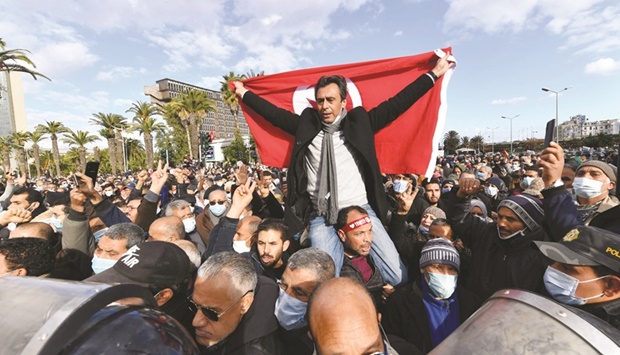Tunisian police used tear gas and water cannons yesterday to disperse hundreds of demonstrators protesting against President Kais Saied’s July power grab, and arrested dozens after they rallied in defiance of a ban on gatherings.
As the country marks 11 years since late dictator Zine El Abidine Ben Ali fled into exile, police deployed heavily in central Tunis to counter rallies calling for an end to Saied’s “coup”. The protesters had gathered despite restrictions on gatherings imposed on Thursday as coronavirus cases surge in the North African country, but which Saied’s opponents say are politically motivated.
AFP reporters saw over 1,000 protesters gathered on Mohamed V Avenue, but they were prevented from reaching the iconic Habib Bourguiba Avenue, epicentre of the vast protests that toppled Ben Ali in 2011.
Some demonstrators broke through a police cordon before police baton charges and tear gas and water cannons pushed them back. AFP reporters saw dozens of arrests. “It’s the most violent intervention by security forces we’ve seen in the past year, both in terms of the methods used and the number of arrests,” said Fethi Jarray, president of the independent anti-torture body the INPT.
Some protesters had chanted: “Down with the coup!”, a reference to Saied’s July 25 moves in which he sacked the government, froze parliament and seized a range of powers.
He has since virtually ruled by decree, to the outrage of his opponents, including the powerful Islamist-inspired Ennahdha party. Some Tunisians, tired of the inept and graft-ridden parliamentary system, welcomed his moves.
But for his critics, both in Ennahdha and on the left, they foreshadowed a possible return to the same kind of autocratic practices that were common under Ben Ali.
Prominent rights activist Sihem Bensedrine, who headed the now-defunct Truth and Dignity Commission (IVD), accused authorities of taking away Tunisians’ right to protest and threatening the country’s “hard-won freedom”. “We’re here to defend the institutions of the republic,” she said.
“This people, which toppled a 23-year dictatorship, is not going to let another dictator take its place.”
One of Saied’s moves was to shift the official anniversary of the revolution from the date of Ben Ali’s flight to December 17, the day in 2010 when vegetable seller Mohamed Bouazizi burned himself alive sparking the first mass protests.
The move was seen as symbolising Saied’s view that the revolution had been stolen. Demonstrator Olfa Laabidi said January 14 remained a symbol.
“There were martyrs, blood was spilled, and there are still people who were wounded in the revolution,” she said.

A Tunisian man waves his country’s national flag during protests against President Kais Saied, on the 11th anniversary of the revolution in the capital Tunis, yesterday.
